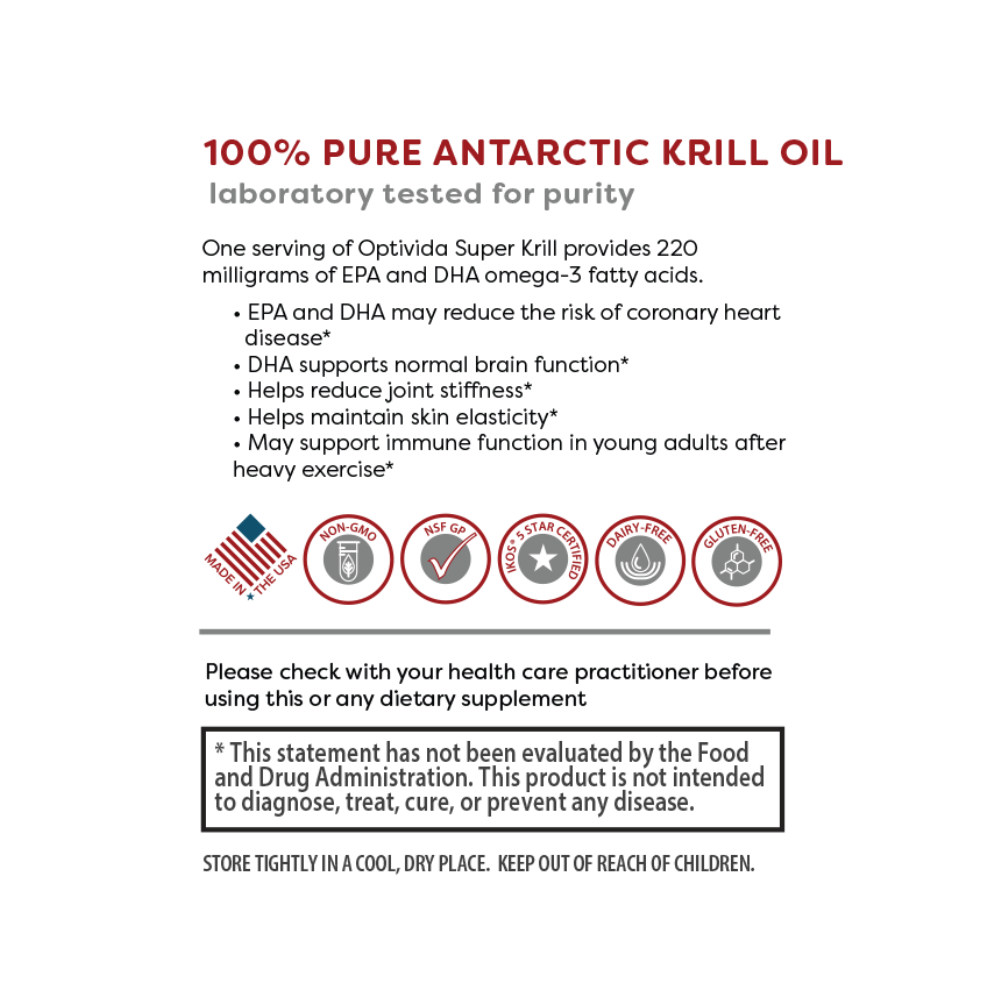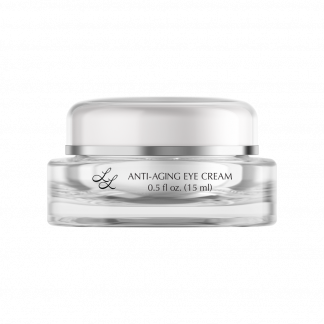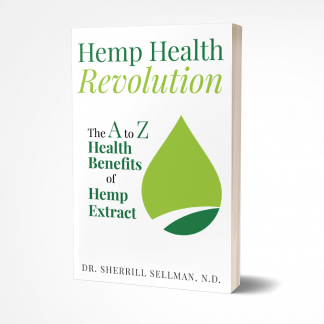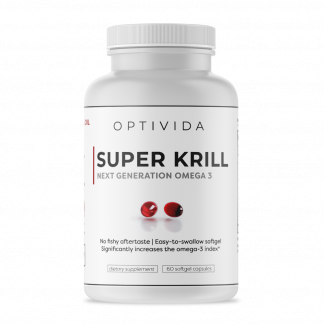Description
Krill oil is 3x more effective than fish oil
Our new advanced formula was created to increase absorption of omega 3 fatty acid levels in the body.[2]
NFS GP Certified
Non-GMO
Dairy-free
Gluten-Free
What does it mean to be sustainably harvested?
Optivida Health’s Super Krill Oil is extracted from small shrimp-like crustacean that live in the Southern Ocean. There are approximately 500 million metric tons of krill in the Antarctic waters, representing the largest marine biomass on earth.[8]
Our Super Krill Oil is sustainably harvested and 100% traceable from sea to shelf. Our eco-harvesting technology is a patented fishing system that delicately brings krill alive and fresh aboard our vessels, while at the same time singling out unwanted by catch and minimizing environmental impact.
Why does your body need Omega 3’s?
Immune Support
Krill oil is more bioavailable than traditional fish oil making it easier for your body to digest which allows your body to absorb the nutrients more effectually. These nutrients include the healthy fats, EPA (eicosapentaenoic acid) and DHA (docosahexaenoic acid), which work to remove inflammation in your immune system.*[3]
Reduce Inflammation
The omega 3’s, EPA (eicosapentaenoic acid) and DHA (docosahexaenoic acid) have been shown to be the most important omega-3s for fighting inflammation. One serving of Optivida Super Krill provides 220 milligrams of EPA and DHA. This product also naturally contains astaxanthin which adds a huge boost to the anti-inflammatory power of krill.*[4]
Brain and Heart Health
Research shows that consumption of the healthy fats EPA (eicosapentaenoic acid) and DHA (docosahexaenoic acid) may reduce the risk of coronary heart disease. DHA also contributes to the maintenance of normal brain function and eye health.*[5,6]
Healthy Skin
The powerful combination of fatty acids and antioxidants found in krill oil have been shown to improve skin health. The fatty acids moisturize the skin and strengthen the skins barrier to naturally increase hydration and elasticity. The antioxidant astaxanthin protects the skin from damage and harmful free radicals.*[7]
Studies have also shown that taking an omega 3 supplement may be able to decrease the symptoms of premenstrual syndrome (PMS).*[1]
Ingredients
Lab-tested for purity
- Omega -3 Fatty Acids (EPA & DHA)
- Fatty acids that are found in fat and cell membranes and can be used as energy.
- Phospholipid
- Represents the building blocks of all cell membranes and therefore effectively delivers EPA and DHA to the blood, tissues and organs.
- Choline
- Important for the synthesis of neurotransmitters (acetylcholine) and phospholipids.
- Astaxanthin
- Contains potent antioxidant properties and protects the omega-3s fatty acids in krill oil from oxidation, keeping them naturally fresh and stable over time.
Why your body needs choline?
Disclaimers
*These statements have not been evaluated by the Food and Drug Administration. These products are not intended to diagnose, treat, cure or prevent any disease. Consult your physician before using any supplement.
References
- Rahbar, N., Asgharzadeh, N. and Ghorbani, R. (2012), Effect of omega‐3 fatty acids on intensity of primary dysmenorrhea. International Journal of Gynecology & Obstetrics, 117: 45-47. doi:10.1016/j.ijgo.2011.11.019
- Ramprasath, V.R.; Eyal, I.; Zchut, S.; Jones, P.J. Enhanced increase of omega-3 index in healthy individuals with response to 4-week n-3 fatty acid supplementation from krill oil versus fish oil. Lipids Health Dis 2013, 12, 178.
- Kiecolt-Glaser JK, Glaser R, Christian LM. Omega-3 fatty acids and stress-induced immune dysregulation: implications for wound healing [published correction appears in Mil Med. 2016 Sep;181(9):1165]. Mil Med. 2014;179(11 Suppl):129–133. doi:10.7205/MILMED-D-14-00167
- Artemis P. Simopoulos (2002) Omega-3 Fatty Acids in Inflammation and Autoimmune Diseases, Journal of the American College of Nutrition, 21:6, 495-505, DOI: 10.1080/07315724.2002.10719248
- Harika RK, Eilander A, Alssema M, Osendarp SJ, Zock PL. Intake of fatty acids in general populations worldwide does not meet dietary recommendations to prevent coronary heart disease: a systematic review of data from 40 countries. Ann Nutr Metab. 2013;63:229–238
- Ahn SH, Lim SJ, Ryu YM, Park HR, Suh HJ, Han SH. Absorption rate of krill oil and fish oil in blood and brain of rats. Lipids Health Dis. 2018;17(1):162. Published 2018 Jul 18. doi:10.1186/s12944-018-0812-7
- Huang TH, Wang PW, Yang SC, Chou WL, Fang JY. Cosmetic and Therapeutic Applications of Fish Oil’s Fatty Acids on the Skin. Mar Drugs. 2018;16(8):256. Published 2018 Jul 30. doi:10.3390/md16080256
- Phleger, C.F.; Nelson, M.M.; Mooney, B.D.; Nichols, P.D. Interannual and between species comparison of the lipids, fay acids and sterols of antarctic krill from the US AMLR elephant island survey area. Comp Biochem Physiol B Biochem Mol Biol 2002, 131, 733-747.









Reviews
There are no reviews yet.